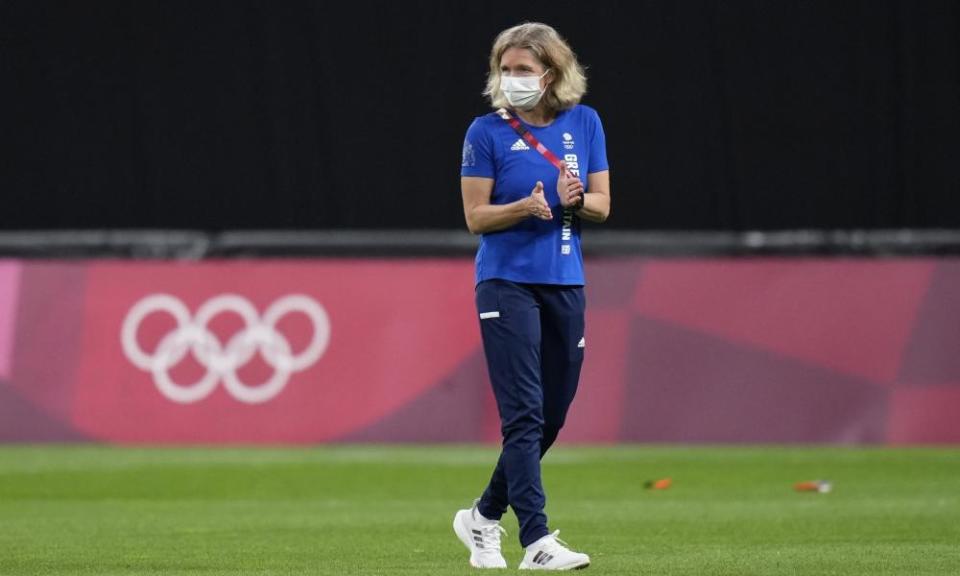Hege Riise shuffles Team GB pack and comes up with winning hand

Perhaps the most pleasing aspect of Team GB’s progression to the knockout stage of the Olympics following their 1-0 victory over Japan was that when the plan faltered there was a back-up.
Manager Hege Riise had resorted to a more defensive midfield against the hosts, with Wales’s Sophie Ingle partnering England’s Keira Walsh in an attempt to limit the spaces where their technically-superior opponents are most potent. To a certain extent the strategy worked in that Team GB kept the ball and a clean sheet (although the finishing of Asako Takaura’s side was also questionable), but the attacking fluidity the team displayed in their first game against Chile was sacrificed.
Defensive solidity matters, and has been lacking in this tournament. There has been 59 goals scored in the 12 games played across the competition so far and just three clean sheets. Two of those belong to Team GB.
When Ingle was hooked for Scotland’s Caroline Weir midway through the second half against Japan it came with a tactical shift, from a holding pair to 4-3-3, and the momentum of the game shifted more decisively in Team GB’s favour. For those that watched England (who have 19 players in the 22 player squad Tokyo) under former manager Phil Neville this was a welcome change. Neville was no stranger to personnel or tactical changes, despite his demand that their style was “non-negotiable”, but often the team looked lost when diverging from the main script.
Related: Ellen White’s flash of subtle brilliance lights up Team GB’s sluggish display | Barney Ronay
Against Japan, the changes were made, the combination-play in attack improved and the team started to stretch their opponent’s backline. This was no doubt helped but the fact that this is a squad packed with leaders. From the official trio of captains – Steph Houghton, Sophie Ingle and Kim Little – to the experience of Lucy Bronze and Ellen White. This is a team full of intelligent, confident and thoughtful players.
There has been an air of focus and purpose that one would expect of any team with ambitions of winning a major tournament but there has also been a less familiar calmness to the Team GB camp. Norwegian Riise, who won this tournament as a player in Sydney in 2000 having previously won the European Championship and World Cup back-to-back in 1993 and 1995, knows what it takes to create a winning environment. “She knows that to play the best football you’ve got to be enjoying it and that’s something that she always tells us,” said Keira Walsh, having also described Riise as a coach that is “relaxed and just wants us to all enjoy it”.
It is only natural that when it comes to playing in a major international competition nerves and excitement will be present, but it seems that the set-up fostered by Riise has helped lift the pressure to perform and, counterintuitively, engendered a more patient and business-like approach to play.
That sense of calm could, in part, also be down to a lack of expectation heading into these Games. Team GB was an unknown entity, Riise an unknown as a manager and the pandemic thrust hurdles in the way that meant just reaching Tokyo was an achievement. Calm breeds calm.
Patience, trust in the process and a cohesiveness to the tactical approach yielded results on Saturday. Now Team GB go into their final Group E game against Canada without the pressure of needing a result. That is a luxury they share only with Sweden, who top Group G. In a 12-team competition there is no easy game beyond the group stage. Win or draw and Riise’s side will play the third-placed team in Group G, which is most likely to be Australia or the US. Lose to Canada and they play the runner-up in Group F, currently topped by the Netherlands with Brazil in second.
It would be easy to be full of fear at the prospect of facing the US given their status as defending world champions, or the Netherlands given their status as World Cup runners-up and reigning European champions, or indeed Sweden given they beat England to bronze at the World Cup in 2019. But the point is this is not England. Rather this is a fresh team with some of the best talent of Scotland and Wales folded in that is playing strategically and effectively. The signs are good.

 Yahoo Finance
Yahoo Finance 